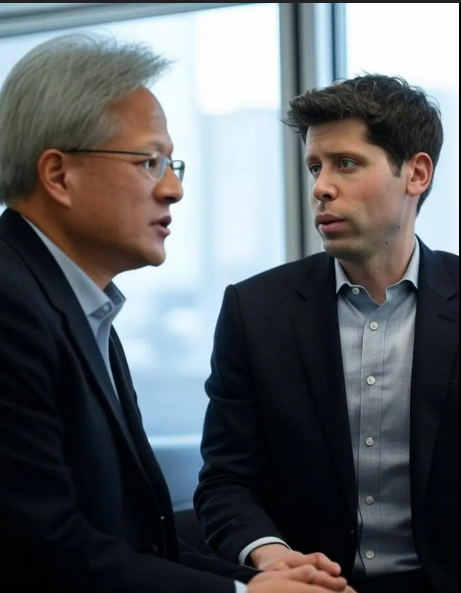
As Washington debates a controversial $100,000 application fee for H-1B visas, two of Silicon Valley’s most influential figures—Nvidia CEO Jensen Huang and OpenAI CEO Sam Altman—have come out in support of the proposal. Their endorsements highlight a growing divide within the technology sector over how best to balance immigration, innovation, and competitiveness.
The H-1B Fee Proposal
The U.S. government’s proposed fee seeks to discourage large-scale bulk applications, particularly from outsourcing companies, while funding training initiatives for American workers. Currently, H-1B visa costs are far lower, and employers often file tens of thousands of applications each year to improve their odds in the lottery system.
The steep hike to $100,000 would represent a historic shift in immigration policy, raising barriers for smaller firms while generating billions in new revenue for workforce development.
Huang’s Argument: Talent Over Cost
At a recent industry forum, Jensen Huang made clear that he supports the measure. “We compete globally, not just locally. The best scientists and engineers want to come here. We should welcome them, regardless of the cost to companies,” Huang said. He argued that without constant inflow of fresh talent, America risks falling behind in AI, graphics, and advanced computing.
Huang further noted that for companies working at the cutting edge, $100,000 is “a small price to pay” for the contributions of a brilliant mind.
Altman’s Perspective: Long-Term Thinking
Sam Altman framed the issue as one of vision. “We have to think about what kind of country we want to be in 20 years. If we start limiting talent inflow now, we’ll regret it later,” he said. Altman added that while the cost may appear exclusionary, it ensures only the most committed companies bring in talent, thereby preventing abuse of the system.
Altman has previously advocated for more open immigration policies, especially for AI researchers and engineers, warning that the U.S. risks losing its leadership position if policies turn restrictive.
Concerns for Startups and SMEs
However, the response from smaller firms has been largely negative. Unlike Nvidia and OpenAI, startups often operate with limited budgets. For them, sponsoring even a handful of foreign workers could become financially unfeasible. Industry bodies have warned that this could choke innovation and discourage entrepreneurship.
An AI startup founder in San Francisco said, “We rely on international talent to build teams. If costs skyrocket, we can’t compete with giants like Nvidia. This fee will widen the gap.”
Backlash from India and Global Stakeholders
India, the largest source of H-1B professionals, has voiced serious concerns. Outsourcing firms and IT majors could face billions in additional costs annually. Observers in India see the proposal as a move to curb their dominance in the U.S. technology market.
Aspiring professionals worry that companies will cut down on applications, limiting opportunities for skilled workers seeking to build careers abroad.
Political Stakes in Washington
The fee proposal has divided lawmakers. Some frame it as a win for American workers, while others argue it undermines diversity and competitiveness. The coming months are expected to see heated hearings in Congress, with lobbying from both industry giants and small businesses.
The Global Race for Talent
The timing of the proposal coincides with aggressive visa reforms by other nations. Canada’s Global Talent Stream, the U.K.’s High Potential Individual visa, and Australia’s skilled migration programs have all been designed to attract the very professionals the U.S. risks alienating.
Both Huang and Altman stressed that immigration is not merely about filling jobs but about securing the intellectual foundations of future technologies.
What Lies Ahead
The final decision on the H-1B fee remains pending. Analysts say a compromise could emerge, such as differential fee structures based on company size. Until then, the debate will continue to expose fault lines within the tech industry, with giants backing the proposal and startups warning of dire consequences.
